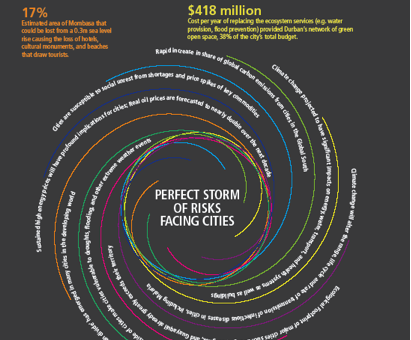Future Proofing Cities: Risks and Responses to Inclusive Urban Growth in Developing Countries
A new report published by Atkins with DPU and the UK Department for International Development assesses the environmental risks to 129 cities across the developing world and how they can future proof.

20 November 2012
Source: Future Proofing Cities report (c)Atkins 2012
The central message of this report is that the earlier cities in developing countries take steps future proof their urban development, the better.
Future proofing cities is about utilising and developing the capabilities of cities to respond to the risks associated with climate change, resource scarcities, and damage to ecosystems in a way that catalyses inclusive urban development. Cities can be part of the solution and are in a good position to lead the way. They are natural units for driving the sort of innovations required to respond to environmental challenges. Many cities have a degree of autonomy which allows city policymakers to act more nimbly than national policy makers in delivering integrated responses to environmental risks.
Given existing infrastructure gaps and the rate at which cities in the developing world are growing, there is also an important window of opportunity for cities to grow in ways which minimise the future economic impact associated with different environmental risks before they are locked into a particular urban form. Empowering cities to overcome challenges in relation to urban governance, planning, finance, and delivery systems are of particular importance.
Currently there are a number of gaps in our knowledge which are making it more difficult for cities in the developing world to act on the environmental risks relevant to them. For example, there are few integrated assessments of the environmental risks and solutions relevant to cities.
Most policy guidance is also inadequately tailored to the specific challenges facing cities with different characteristics: the guidance that exists typically provides long lists of policies to, for example, green a city, without considering the relevance of policies to different cities based on the risks they face, and their vulnerability and capacity to respond to risks. Additional attention is also needed to identify which solutions can generate social and economic benefits, alongside environmental ones: this is crucial if cities are to build support among communities and city stakeholders for sustained programmes of action.
To help close these gaps in our understanding of the risks and responses to inclusive urban development in developing countries, Atkins and UCL’s Development Planning Unit in partnership with the UK’s Department for International Development (DFID), has built on its collective work on urban areas and the environment to explore how cities in the developing world might better assess - in a holistic way - the environmental risks relevant to them and the combinations of policies likely to be most effective in promoting inclusive urban development.
The foundation for the work has been an integrated assessment of the risks, vulnerabilities, and capacities of 129 cities across 20 countries spanning Asia and Africa, and the development of five urban typologies to group these cities based on the most significant environmental risks they face. This work is intended as a pilot, but to our knowledge it is the first time that typologies have been developed for a significant sample of cities in developing countries, while adopting a holistic approach.
These typologies are used to help point the way to towards the universe of policy solutions likely to be applicable to different types of cities. A list of over 100 policy options are presented with an overview of which are likely to be most relevant to different city types, how these policies might be integrated, the extent to which they deliver wider social and economic benefits, and how challenging they are to implement given their governance, planning, finance, and delivery requirements.
This project was led by Atkins with the participation of Vanesa Castan Broto, Adriana Allen, Caren Levy and Linda Westman from the DPU, who were responsible for providing strategic guidance throughout the development of the project’s analytical framework and for the production of five in-depth case studies that provide a nuanced exploration of the combined challenges and opportunities for future proofing urban development in Bangkok, Maputo, Bangalore, Karachi and Nairobi.
To find out more about the DPU involvement in this project contact Adriana Allen.
 Close
Close

